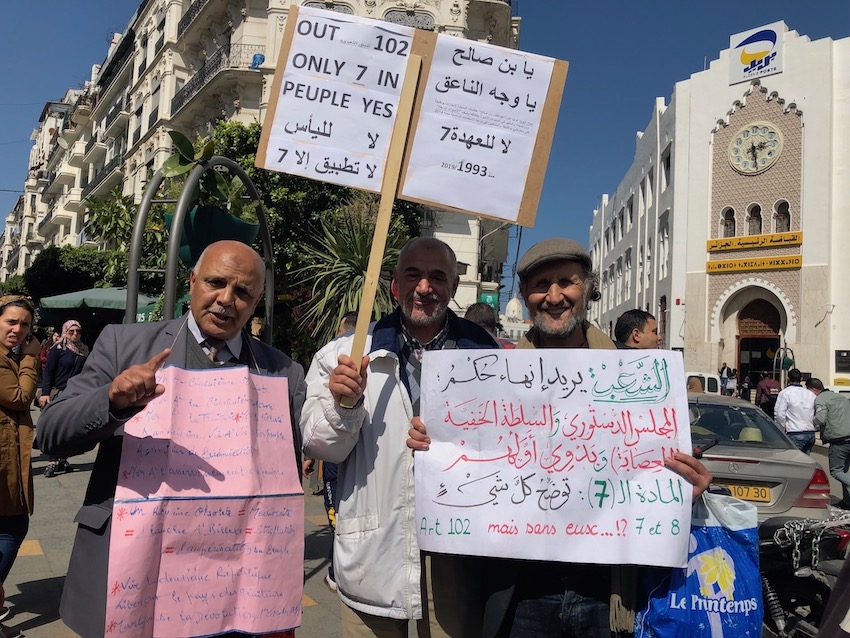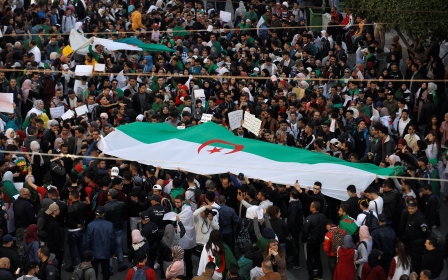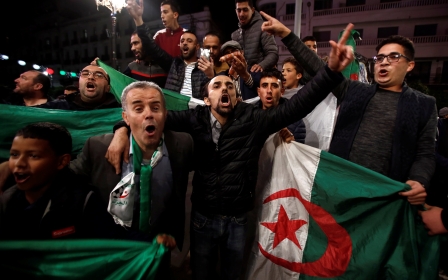'The journey is still long': Algiers, the day after Bouteflika

On Wednesday, the day after Algerian president Abdelaziz Bouteflika resigned, a group of demonstrators occupied the steps of the colonial-era Grand Post Office, a landmark in the heart of the Algiers. By the afternoon, police officers were trying to remove them.
Abdelouhab, 61 years-old, reluctantly complies. From Algeria's eastern district of Bordj Bou Arreridj, he travelled 240 kilometres to celebrate in the capital. He says he is confident about the country's future, which "can only be bright now that the people have awoken".
But Abdelouahab is not the only one who feels like hope has been rediscovered. His friend Zakri, 54, says he is feeling positive about the country for the first time in 20 years when Bouteflika came to power backed by the army.
'If there is any foreign interference or seizure of power by any party... the people will not let it happen'
- Soufiane, 24, student
"After having lost all hope, the Algerians showed me what they can do. They are wonderful people," says the French teacher.
A crowd gathers around the friends and passers-by read the ten or so claims written on a pink placard covering Abdelouhab's grey suit and tie.
New MEE newsletter: Jerusalem Dispatch
Sign up to get the latest insights and analysis on Israel-Palestine, alongside Turkey Unpacked and other MEE newsletters
"Long live the Second Republic!" reads one. The two men raise their voices to make themselves heard, despite the presence of the police. "We have taken the first step," says Abdelouhab, "but the journey is still long."
The night of Bouteflika's resignation, announced on state media only days after a million people turned out in the capital to demand his exit, brought flags and celebrations to the streets of Algiers. The following day filled the city's spaces with conversations about Algeria's future.
A few steps away in a cafe, 24-year-old Sufiane shares a chocolate waffle with a friend while discussing the week's news.
"We saw that it was possible to be united for a cause and achieve real results," the young student says, sitting in a leather armchair.
He pronounces himself "70 per cent confident because in the last seven weeks I have discovered a face of Algeria that I hadn't seen before", and "30 per cent worried because I fear foreign interference - we don't know who's pulling the strings and who's running the country."
Sitting at the next table, Kahina, 38, joins the conversation. "Even good news is being met with concern, as we wait for the bad news behind it."
The two agree and Soufiane references social media rumours about the possible influence of the US over Algeria's military before snapping back into perspective and putting his faith in the movement that forced Bouteflika from power.
"We have shattered the wall of fear. If there is any foreign interference or seizure of power by any party, like the army, the people will not let it happen... the army knows that the whole world is watching. They know that a single mistake can lead to foreign intervention, and we know that the army is very protective of the territory."
Standing by the coffee shop's window, 29-year-old Karim smokes a cigarette while squinting. After hitting "rock bottom", he feels the future can only be better and though he distrusts Islamists, who he feels win Algerians "with fine speeches", the sentiment he sees online reassures him.
Spaces for dialogue and freedom
In Square Port Said on the banks of the Kasbah, La Baignoire, a place famed for the exchange of ideas and debate between entrepreneurs and artists, has been hosting courses on the constitution every week since the beginning of the movement.
Sitting around a large table in the lobby, 32-year-old Sarah quickly fills in the blank pages of her notebook as the session progresses. The young woman, a jurist, praises the initiative.
"We feel that there are spaces for dialogue and freedom that are open to us," she says, while also fearing a step backwards. "All of this could suddenly vanish. And we could very soon return to the previous state of affairs."
'We've been quiet for years, we have to catch up!'
- Anis, 25, student
She notes 20 years of political stalemate and social disarray the country has just gone through as the basis of her fear that change that goes deeper than Bouteflika's departure might not take hold, and the motivation for her to stay active and mobilised. She is preparing to lecture students from Boumerdes on constitutional law over the weekend.
"These are actions I believe in. Discussing and exchanging will help us to break out of isolation and build our future."
After two hours of classes, the amateur constitutional law students leave the room tired but enthusiastic. Anis, 25, plans to protest again on the coming Friday and discusses with his friends the demands they will present now that they have managed to force out Bouteflika.
"There are so many more! We don't know where to start," he says. Reforms, he insists, are necessary even if he and his friends have been exhausted by the six weeks of protest every Friday.
"We'll keep going," the young man says, exuding energy. "We've been quiet for years, we have to catch up!"
Middle East Eye delivers independent and unrivalled coverage and analysis of the Middle East, North Africa and beyond. To learn more about republishing this content and the associated fees, please fill out this form. More about MEE can be found here.




